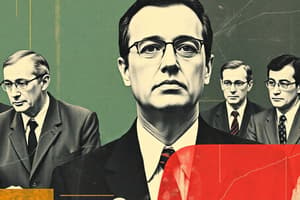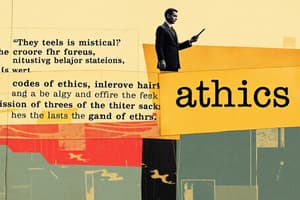Podcast
Questions and Answers
A benefit of the individual approach is that when managers make decisions that are made in the individual's best interests, this will usually benefit most people.
A benefit of the individual approach is that when managers make decisions that are made in the individual's best interests, this will usually benefit most people.
False (B)
The task and general environments make up an organization's internal environment.
The task and general environments make up an organization's internal environment.
False (B)
The beliefs by individuals regarding what they feel others will observe in their behavior are called ethics.
The beliefs by individuals regarding what they feel others will observe in their behavior are called ethics.
False (B)
New developments in methods for transforming resources into goods or services are _____ forces.
New developments in methods for transforming resources into goods or services are _____ forces.
Marketing for a startup small business to obtain many small new customers is known as crowdfunding.
Marketing for a startup small business to obtain many small new customers is known as crowdfunding.
A whistle-blower is usually a stakeholder who reports organizational misconduct to the public.
A whistle-blower is usually a stakeholder who reports organizational misconduct to the public.
When Bernard Madoff used money from newer investors to pay off older ones, this was an example of ____.
When Bernard Madoff used money from newer investors to pay off older ones, this was an example of ____.
Since the 1950s, the percentage of the U.S. labor force represented by unions has _____.
Since the 1950s, the percentage of the U.S. labor force represented by unions has _____.
Members of the board of directors are elected by the stockholders.
Members of the board of directors are elected by the stockholders.
The justice approach to deciding ethical dilemmas is guided by _____.
The justice approach to deciding ethical dilemmas is guided by _____.
Associations that are utilized by government agencies to monitor manufacturing and agricultural needs and developments are known as government regulators.
Associations that are utilized by government agencies to monitor manufacturing and agricultural needs and developments are known as government regulators.
The first law of business is to take care of the employees and stockholders.
The first law of business is to take care of the employees and stockholders.
The macroenvironment includes these forces: _______.
The macroenvironment includes these forces: _______.
An organization's internal stakeholders consist of ___.
An organization's internal stakeholders consist of ___.
Changes in the economic, political, legal, and technological global system that may affect an organization are ______ forces.
Changes in the economic, political, legal, and technological global system that may affect an organization are ______ forces.
Stakeholders are competitors of the organization who have an interest, or stake, in stealing a company's business.
Stakeholders are competitors of the organization who have an interest, or stake, in stealing a company's business.
The board of directors of a corporation are responsible for seeing that the company is run according to the employees' interests.
The board of directors of a corporation are responsible for seeing that the company is run according to the employees' interests.
External stakeholders include the owners and board of directors.
External stakeholders include the owners and board of directors.
The general environment, or macroenvironment, includes six forces: economic, technological, sociocultural, demographic, political-legal, and international.
The general environment, or macroenvironment, includes six forces: economic, technological, sociocultural, demographic, political-legal, and international.
Changes in the way politics shape laws and laws shape the opportunities for and threats to an organization are ____ forces.
Changes in the way politics shape laws and laws shape the opportunities for and threats to an organization are ____ forces.
The owners of an organization consist of all those who can claim it as their legal property.
The owners of an organization consist of all those who can claim it as their legal property.
Research has shown that students who don't actually do the assigned work and cheat are more likely to commit felonies and develop depression disorders.
Research has shown that students who don't actually do the assigned work and cheat are more likely to commit felonies and develop depression disorders.
New developments in methods for transforming resources into goods or services are _____ forces.
New developments in methods for transforming resources into goods or services are _____ forces.
The utilitarian approach is guided by what will result in the individual's best long-term interests.
The utilitarian approach is guided by what will result in the individual's best long-term interests.
The macroenvironment includes these forces: _______.
The macroenvironment includes these forces: _______.
Regulatory agencies that establish ground rules under which organizations may operate are known as ____.
Regulatory agencies that establish ground rules under which organizations may operate are known as ____.
Flashcards are hidden until you start studying
Study Notes
Individual Approach
- The individual approach in decision-making does not guarantee a benefit to most people.
Organizational Environment
- The task and general environments do not comprise an organization's internal environment.
Ethics
- Personal beliefs about others’ perceptions of behavior do not define ethics.
Technological Forces
- New methods for converting resources into goods and services are classified as technological forces.
Crowdfunding
- Marketing strategies for startups aimed at acquiring numerous small customers are not considered crowdfunding.
Whistle-blowing
- A whistle-blower is a stakeholder who reports misconduct within an organization to the public.
Ethical Dilemmas
- Bernard Madoff's scheme, using funds from new investors to pay old ones, exemplifies an ethical dilemma.
Labor Unions
- Since the 1950s, the representation of unions in the U.S. labor force has steadily declined.
Board of Directors
- Board members are elected by the stockholders of the corporation.
Justice Approach
- The justice approach in ethical dilemmas focuses on impartiality, fairness, and equity.
Government Regulators
- Associations monitoring manufacturing and agricultural developments do not solely identify as government regulators.
Business Fundamentals
- The assertion that the first law of business is to prioritize employees and stockholders is incorrect.
Macroenvironment Forces
- The macroenvironment encompasses economic, technological, sociocultural, demographic, political-legal, and international forces.
Internal Stakeholders
- Internal stakeholders of an organization include the board of directors, employees, and owners.
International Forces
- Changes in the global economic, political, legal, and technological landscapes impact organizations as international forces.
Stakeholder Misconception
- Stakeholders are not competitors seeking to undermine the organization.
Board Responsibilities
- The board of directors does not primarily represent the interests of employees.
External Stakeholders
- Owners and board members are classified as internal stakeholders, not external.
General Environment
- The macroenvironment includes six distinct forces: economic, technological, sociocultural, demographic, political-legal, and international.
Political-Legal Forces
- Changes in how politics influence laws and shape opportunities and threats for organizations are political-legal forces.
Ownership
- The owners of an organization are all individuals with legal claims to its property.
Research on Academic Integrity
- Evidence does not support the claim that students who cheat are more likely to commit felonies or develop depression disorders.
Recap on Technological Forces
- Innovations in transforming resources into products or services reaffirm the classification of technological forces.
Reiteration of the Organizational Environment
- The previous claims about the task and general environments not forming an organization’s internal environment are reiterated.
Utilitarian Approach
- The utilitarian approach is misinterpreted as being centered on individual long-term interests.
Government Regulators Definition
- Regulatory agencies that set operational parameters for organizations are defined as government regulators.
Studying That Suits You
Use AI to generate personalized quizzes and flashcards to suit your learning preferences.




